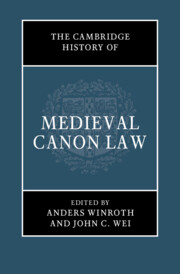Book contents
- The Cambridge History of Medieval Canon Law
- The Cambridge History of Medieval Canon Law
- Copyright page
- Contents
- Figures
- Maps
- Tables
- Contributors
- Acknowledgments
- Abbreviations
- Medieval Canon Law: Introduction
- Part I The History of Medieval Canon Law
- Part II The Sources and Dissemination of Medieval Canon Law
- Part III Doctrine and Society
- Iudicium
- Clerus
- Conubium
- Crimen
- 26 Criminal Law
- 27 Ecclesiastical Discipline: Heresy, Magic, and Superstition
- 28 Just War and Crusades
- 29 Excommunication and Interdict
- Conclusion
- Bibliography of Primary Sources
- Index
- References
29 - Excommunication and Interdict
from Crimen
Published online by Cambridge University Press: 13 January 2022
- The Cambridge History of Medieval Canon Law
- The Cambridge History of Medieval Canon Law
- Copyright page
- Contents
- Figures
- Maps
- Tables
- Contributors
- Acknowledgments
- Abbreviations
- Medieval Canon Law: Introduction
- Part I The History of Medieval Canon Law
- Part II The Sources and Dissemination of Medieval Canon Law
- Part III Doctrine and Society
- Iudicium
- Clerus
- Conubium
- Crimen
- 26 Criminal Law
- 27 Ecclesiastical Discipline: Heresy, Magic, and Superstition
- 28 Just War and Crusades
- 29 Excommunication and Interdict
- Conclusion
- Bibliography of Primary Sources
- Index
- References
Summary
By the twelfth century, excommunication and interdict were the principal spiritual sanctions of the western Church. Excommunication meant exclusion from the sacraments, notably the Eucharist, and in its harshest form separation from the communion of the faithful. Interdicts, on the other hand, did not cut off members from the body of the Church but did suspend the spiritual benefits of membership, notably participation in most sacraments and other religious rites.
- Type
- Chapter
- Information
- The Cambridge History of Medieval Canon Law , pp. 550 - 570Publisher: Cambridge University PressPrint publication year: 2022
References
Select Bibliography
- 2
- Cited by

